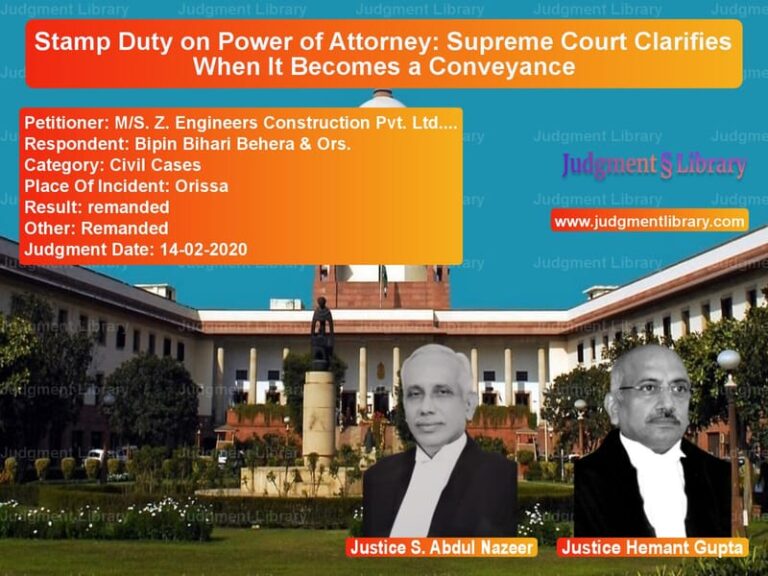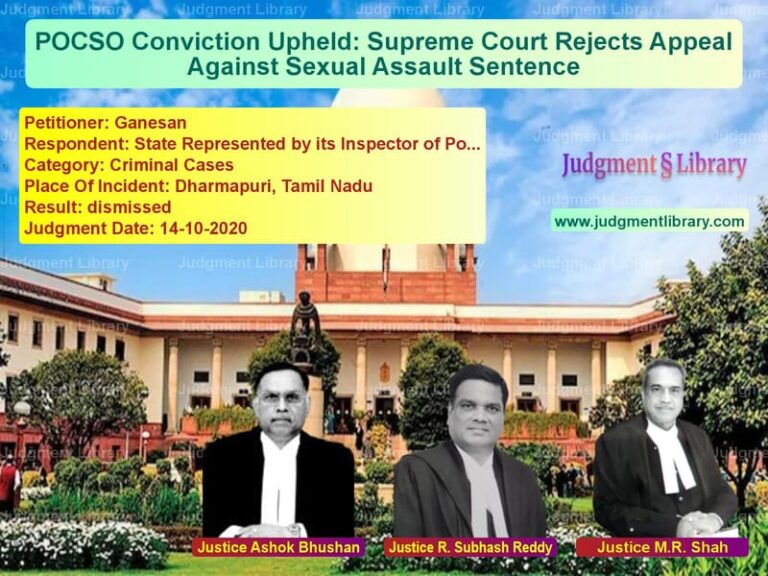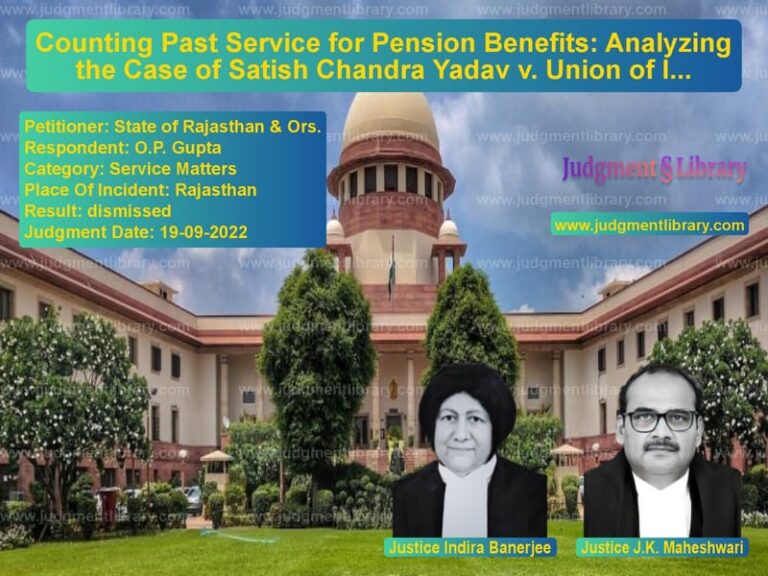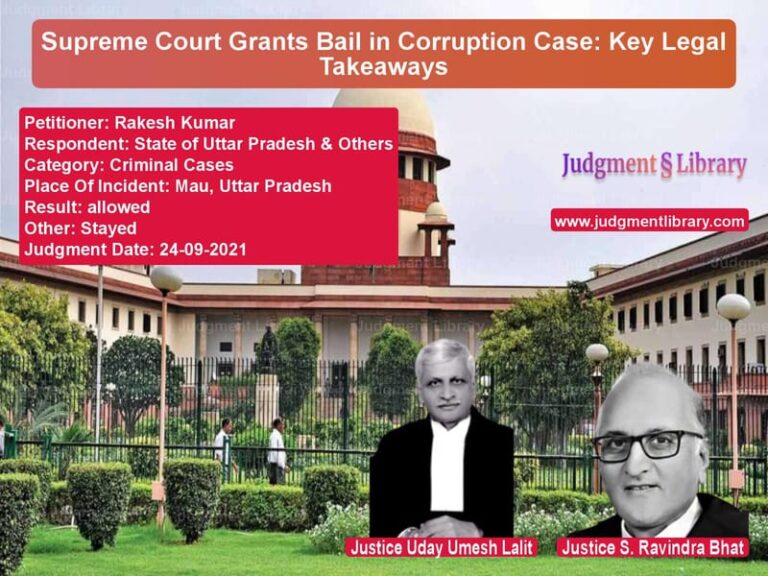Acquittal in Maharashtra Murder Case Due to Investigation Lapses
The Supreme Court of India recently delivered a landmark judgment in the case of Prakash Nishad @ Kewat Zinak Nishad vs. State of Maharashtra. This case revolved around a gruesome crime involving the sexual assault and murder of a six-year-old girl, leading to the conviction and death sentence of the appellant. However, upon thorough judicial scrutiny, the Supreme Court quashed the conviction, citing severe lapses in the investigation, mishandling of evidence, and procedural violations that compromised the integrity of the trial. This judgment highlights the fundamental principles of fair trial, due process, and the importance of maintaining an unbroken chain of evidence in cases relying solely on circumstantial evidence.
Background of the Case
The case originated from FIR No.109/2010, registered on June 12, 2010, at Police Station Bhayander, Thane, Maharashtra. The appellant, Prakash Nishad, was charged under Sections 376, 377, 302, and 201 of the Indian Penal Code, 1860, for the rape, unnatural sexual assault, murder, and destruction of evidence related to a minor victim. The trial court convicted him based on circumstantial evidence and awarded him the death penalty under Section 302 IPC, along with life imprisonment for the sexual offenses.
The conviction was upheld by the High Court of Bombay, which confirmed the death sentence. However, upon appeal, the Supreme Court found that the investigation suffered from severe procedural defects, ultimately leading to the appellant’s acquittal.
Key Legal Issues Considered
- Validity of Disclosure Statements: The appellant’s statements were recorded in Marathi, a language he did not understand. This raised serious concerns about the voluntariness and admissibility of the confessions.
- Reliability of DNA Evidence: The forensic samples were mishandled, and their chain of custody was not properly maintained, raising doubts about their authenticity.
- Breaks in the Chain of Circumstantial Evidence: The prosecution failed to establish an unbroken sequence of events leading conclusively to the appellant’s guilt.
- Failure to Establish Guilt Beyond Reasonable Doubt: The Court reiterated that in cases relying solely on circumstantial evidence, every link in the chain must be established beyond doubt.
Arguments by the Petitioner
The petitioner, Prakash Nishad, through his legal counsel, argued that his conviction was based on flawed and unreliable evidence. His key contentions were:
- The disclosure statements attributed to him were neither voluntary nor recorded in a language he understood.
- There was no direct evidence linking him to the crime.
- The forensic evidence lacked credibility due to mishandling and inconsistencies in the chain of custody.
- Witnesses provided contradictory statements, undermining the prosecution’s case.
- The case was based purely on circumstantial evidence, which failed to conclusively prove his guilt.
Arguments by the Respondent
The State of Maharashtra defended the conviction, asserting the following points:
- DNA evidence linked the appellant to the victim.
- Recovered items from his residence matched forensic reports.
- The circumstantial evidence, taken as a whole, pointed conclusively to the appellant’s guilt.
Supreme Court’s Findings
Upon reviewing the case, the Supreme Court found multiple flaws in the investigation and prosecution’s case, leading to the appellant’s acquittal. The key findings were:
1. Non-Compliance with Language Rights
The Court noted that the appellant’s confessional statements were recorded in Marathi, despite the fact that he did not understand the language. The investigating officer failed to ensure that the contents of the statements were read out and explained to him in his vernacular language. Citing Syed Qasim Razvi v. State of Hyderabad (1953 SCR 589), the Court emphasized that when an accused does not understand the language in which evidence is recorded, it causes prejudice and affects the fairness of the trial.
2. Mishandling of Forensic Evidence
The forensic samples collected from the victim and the appellant were not handled according to established protocols. The samples were sent for analysis with unexplained delays, raising concerns about possible contamination. The Court referred to the Maharashtra Police Manual and the Guidelines for Collection, Storage, and Transportation of Crime Scene DNA Samples, both of which stress the importance of maintaining the chain of custody to preserve the integrity of forensic evidence.
3. Contradictions in Witness Testimonies
Several prosecution witnesses gave contradictory statements, particularly regarding the recovery of incriminating articles. Some witnesses claimed that the victim’s clothing was recovered from the appellant’s house, while others stated that the same items were found at the crime scene. These inconsistencies weakened the prosecution’s case.
4. Failure to Rule Out Other Suspects
The prosecution failed to investigate or rule out the possibility of other individuals being involved in the crime. The Supreme Court noted that key witnesses who could have provided crucial information were not examined, leaving significant gaps in the investigation.
5. Death Penalty in Cases Based on Circumstantial Evidence
The Supreme Court reiterated that in cases relying solely on circumstantial evidence, the prosecution must establish guilt beyond all reasonable doubt. The Court cited Sharad Birdhichand Sarda v. State of Maharashtra (1984) 4 SCC 116, which held that circumstantial evidence must form a complete chain, ruling out any other hypothesis except the guilt of the accused. Since the prosecution failed to meet this standard, the appellant’s conviction and death sentence could not be sustained.
Conclusion
The Supreme Court’s judgment in this case serves as a crucial reminder of the fundamental principles of criminal justice. It underscores the importance of conducting fair and unbiased investigations, maintaining the integrity of forensic evidence, and ensuring that accused individuals receive a trial free from procedural errors.
In light of the significant lapses in the investigation, the Supreme Court quashed the conviction and set aside the death penalty. The appellant was ordered to be released immediately.
Implications of the Judgment
This ruling has far-reaching implications for the criminal justice system:
- Emphasis on Procedural Fairness: Law enforcement agencies must ensure that accused individuals fully understand their rights and that procedural safeguards are strictly followed.
- Strict Adherence to Forensic Protocols: Courts will scrutinize the handling of forensic evidence more rigorously to prevent wrongful convictions.
- Higher Standards for Death Penalty Cases: The judiciary will demand stronger and more conclusive evidence before affirming capital punishment.
The judgment reaffirms the principle that justice must not only be done but also be seen to be done. While the crime itself was heinous, the Supreme Court rightly emphasized that convictions must be based on reliable and legally admissible evidence, ensuring that innocent individuals are not wrongfully punished.
Petitioner Name: Prakash Nishad @ Kewat Zinak Nishad.Respondent Name: State of Maharashtra.Judgment By: Justice B.R. Gavai, Justice Vikram Nath, Justice Sanjay Karol.Place Of Incident: Thane, Maharashtra.Judgment Date: 19-05-2023.
Don’t miss out on the full details! Download the complete judgment in PDF format below and gain valuable insights instantly!
Download Judgment: prakash-nishad-@-kew-vs-state-of-maharashtra-supreme-court-of-india-judgment-dated-19-05-2023.pdf
Directly Download Judgment: Directly download this Judgment
See all petitions in Bail and Anticipatory Bail
See all petitions in Custodial Deaths and Police Misconduct
See all petitions in Fraud and Forgery
See all petitions in Judgment by B R Gavai
See all petitions in Judgment by Vikram Nath
See all petitions in Judgment by Sanjay Karol
See all petitions in allowed
See all petitions in Quashed
See all petitions in supreme court of India judgments May 2023
See all petitions in 2023 judgments
See all posts in Criminal Cases Category
See all allowed petitions in Criminal Cases Category
See all Dismissed petitions in Criminal Cases Category
See all partially allowed petitions in Criminal Cases Category







